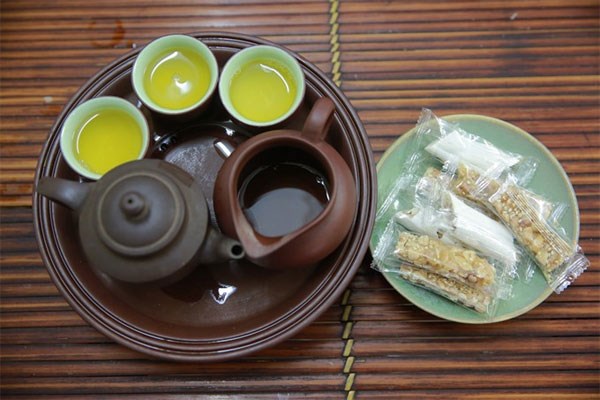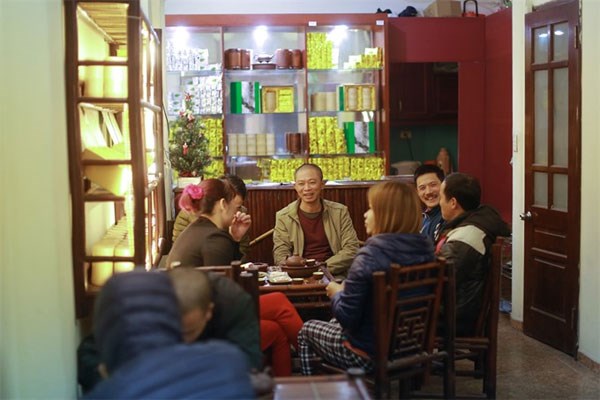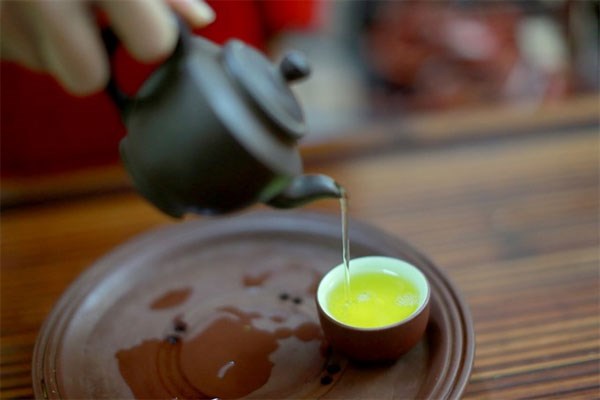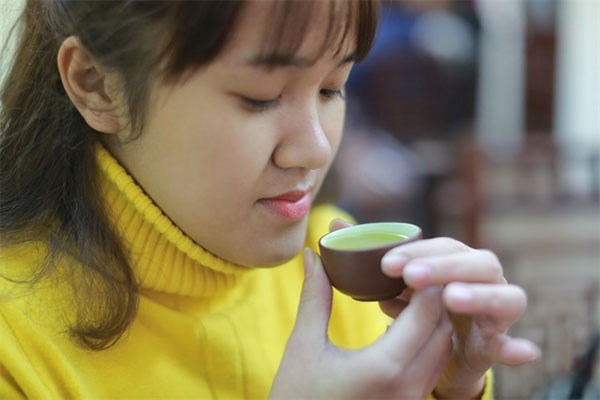
A treat: Tea can be served with sesame and peanut candies to increase the sweet taste.
Tea
drinking is a daily habit of Vietnamese. Tea is served at formal and informal
meetings, during meals and a gathering of friends. Offering a cup of tea also
expresses hospitality and friendliness.
When
talking about tea and the place of perfect tea products, most Vietnamese people
mention Tan Cuong Commune, the northern province of Thai Nguyen, as the first
destination.
Tan
Cuong tea scores high in the international market. This highland district is
well-known in Vietnam for its cultivation of aromatic tea for 100 years.
This
special product from Tan Cuong Commune possesses a delicious taste that can
mesmerise even the choosiest tea drinkers. The first sip leaves a bitter taste
on the tip of the tongue, but that taste immediately transforms into a deep
sweet flavour when the tea is swallowed.

Gather round: In the chill of winter, a group of friends can sit around a tea table, effusively praise the taste of a hot cup of tea and enjoy talking.
Located
in the red-brown soil of the midlands mountain area, Tan Cuong is highly
suitable for tea bushes. The soil is slightly acrid, which gives the tea a
taste found nowhere else, according to PhD Nguyen Lan Anh from the Ha Noi
Tourism College.
“The
natural characteristics and climate conditions favour Tan Cuong Commune with
wonderful tea products,” said Anh.
“Besides,
the experience and technique of local farmers in growing and processing tea
leaves creates a specialty that people enjoy down to the last drop.”
Currently,
the province has nearly 1,500ha of tea which produces 19,000 tonnes of tea buds
a year.
“Tan
Cuong tea is exported to many countries, including Russia, the United States
and Japan,” she said.

Precious: Connoisseurs use pottery kettle and cups to preserve the original taste and scent of tea.

Fragrant: While drinking tea, we should enjoy both the scent and taste of tea. — VNS Photos Truong Vi
Tea
is the strategic product of Thai Nguyen Province. In recent years, tea bushes
have provided high economic value and jobs for thousands of farmers.
That’s
why local people strive to make high quality products and build up a
prestigious brand.
“Tan
Cuong Tea is totally fed with organic fertilisers and is free from pesticides
and plant protection chemicals harmful to human health,” said Dam Hong Quang,
owner of Viet Co Tra brand, which produces and sells Tan Cuong tea.
“Tan
Cuong tea is picked with the standard ‘one bud, two leaves’, the best part of a
tea bush, to ensure the best quality,” he said.
The
leaves are processed using traditional secrets. After being picked, green tea
buds are stored carefully until they reach perfection, then delivered to the
factory for processing, where they are dried and roasted several times in large
pans.
It
is necessary to evenly and smoothly stir the leaves to soften them and preserve
the natural green colour. The dried tea is packed in vacuum bags, which are
thick enough to keep all light and air out.
To
make 1kg of dried tea, 20 workers have to collect tea buds for two hours early
in the morning.
“During
the picking, if it rains heavily or the sun is scorching, the taste of tea will
change,” said Quang.
“It
can be more bitter or the colour of the tea may be not green. Some people drink
tea mixed with dried roses, lotuses or daisies.”
However,
Quang prefers drinking pure Tan Cuong tea to enjoy its full fragrance.
“Tea
is good for your health,” he said. “Throughout its history, tea has been
associated with important health benefits. Many studies show that tea contains
a high level of antioxidants, vitamins, minerals, and mild stimulants.”
You
don’t need to be a connoisseur to enjoy tea. In the chill of winter, a group of
friends can sit around a tea table, effusively praise the taste of a hot cup of
tea and enjoy talking. The world shrinks to the people around the kettle. The
sweet taste of tea and keo lac (peanut candy), which is often served at a tea
party, can linger on your lips for a long time.
By VNS